牛津上海版英语九年级上册课件:Unit 4 Computers Grammar(共35张PPT)
文档属性
| 名称 | 牛津上海版英语九年级上册课件:Unit 4 Computers Grammar(共35张PPT) |
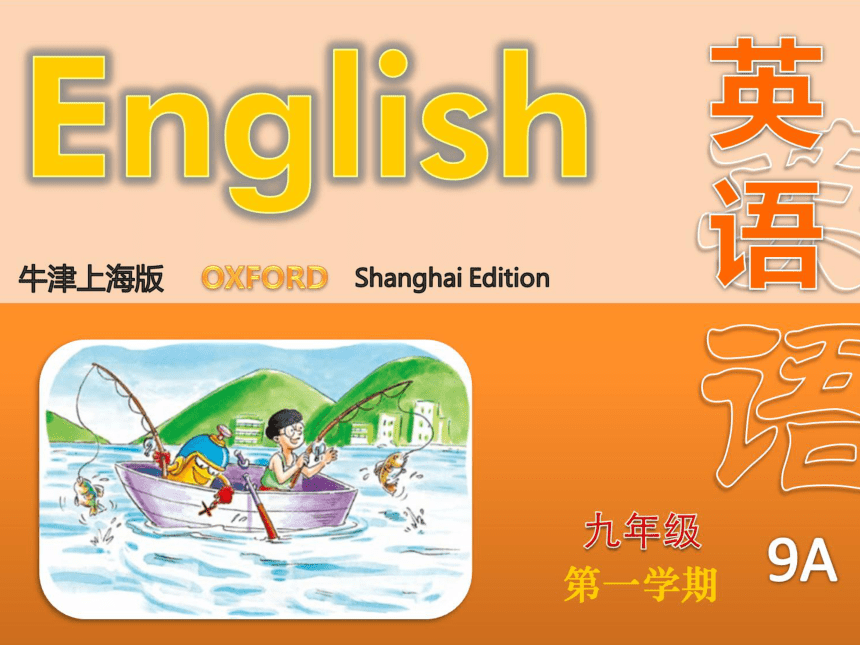
|
|
| 格式 | zip | ||
| 文件大小 | 19.9MB | ||
| 资源类型 | 教案 | ||
| 版本资源 | 牛津上海版(试用本) | ||
| 科目 | 英语 | ||
| 更新时间 | 2016-06-19 00:00:00 | ||
图片预览

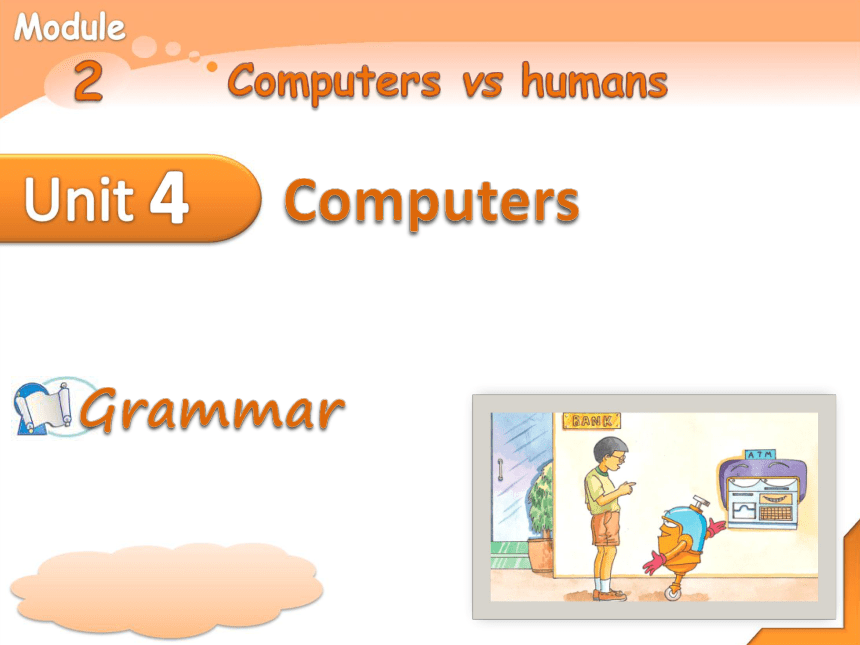
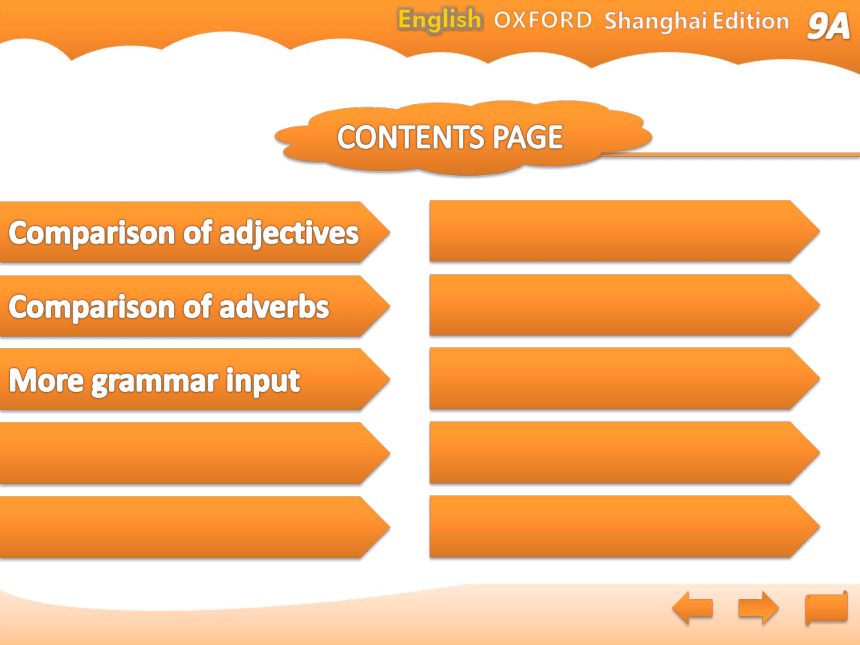
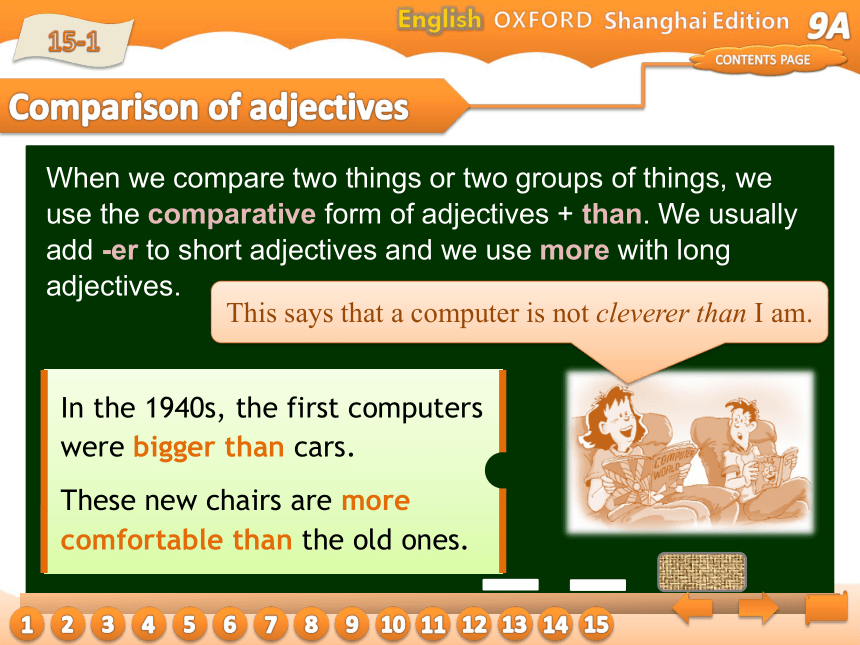
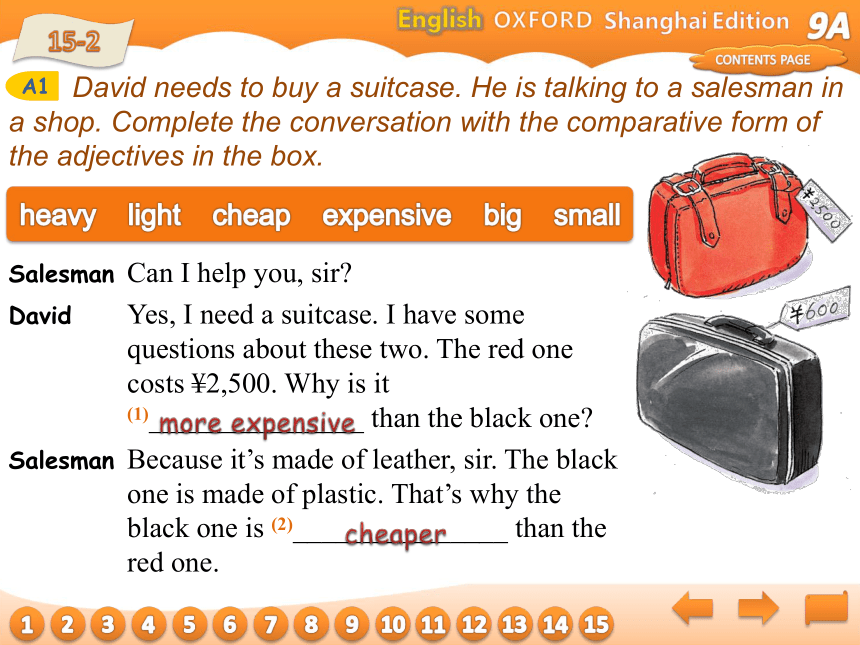
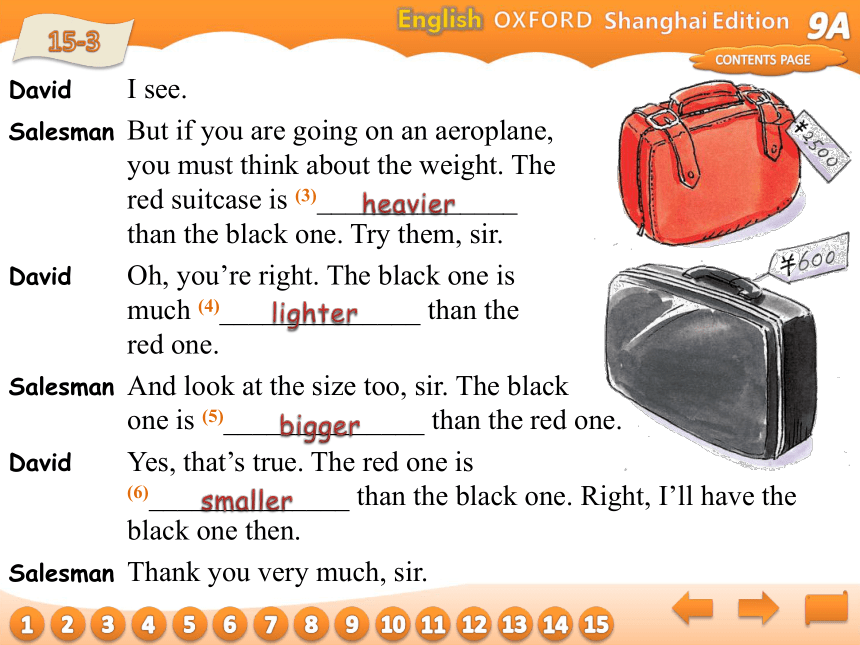



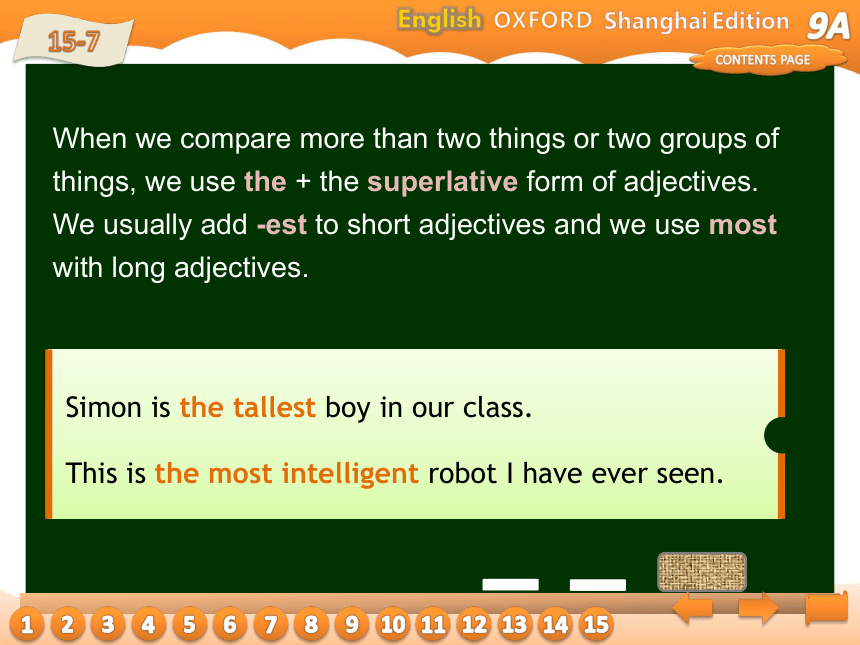
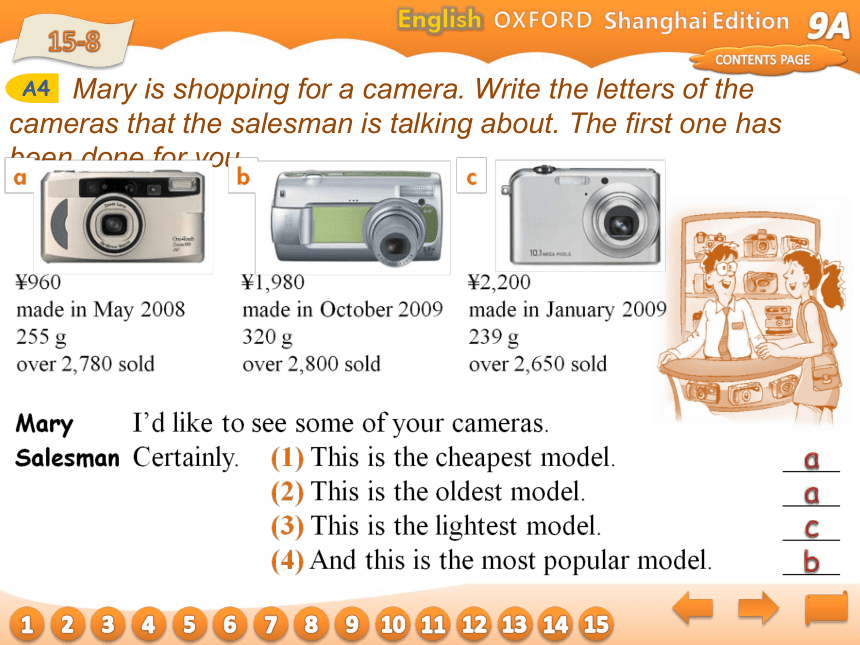
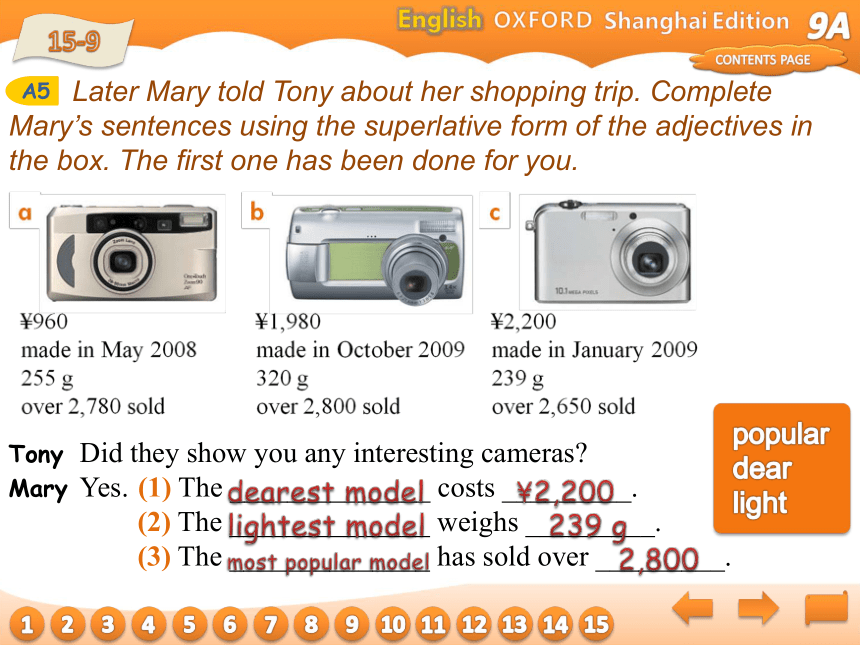
文档简介
课件35张PPT。Grammar2Computers vs humans4ComputersCONTENTS PAGEComparison of adjectivesComparison of adverbsMore grammar inputComparison of adjectives15-11234When we compare two things or two groups of things, we use the comparative form of adjectives + than. We usually add -er to short adjectives and we use more with long adjectives.56This says that a computer is not cleverer than I am.789101112131415 David needs to buy a suitcase. He is talking to a salesman in a shop. Complete the conversation with the comparative form of the adjectives in the box.A115-2heavy light cheap expensive big smallSalesman Can I help you, sir?
David Yes, I need a suitcase. I have some questions about these two. The red one costs ¥2,500. Why is it (1)_______________ than the black one?
Salesman Because it’s made of leather, sir. The black one is made of plastic. That’s why the black one is (2)_______________ than the red one.more expensivecheaper123456789101112131415David I see.
Salesman But if you are going on an aeroplane, you must think about the weight. The red suitcase is (3)______________ than the black one. Try them, sir.
David Oh, you’re right. The black one is much (4)______________ than the red one.
Salesman And look at the size too, sir. The black one is (5)______________ than the red one.
David Yes, that’s true. The red one is (6)______________ than the black one. Right, I’ll have the black one then.
Salesman Thank you very much, sir.15-3heavierlighterbiggersmaller12345678910111213141515-4 Work in pairs to do this quiz. S1 asks the questions. S2 uses the information in the box below to answer the questions. The first one has been done for you.A21 S1 (river/long) ______________________, the Nile or the Amazon?
S2 __________________________.Which river is longerThe Nile is longer12345678910111213141515-52 S1 (continent/big) __________________________, Africa or Asia?
3 S1 (mountain/high) ____________________, Qomolangma or K2?
4 S1 (island/large) _____________________, Greenland or Borneo?
5 S1 (ocean/deep) __________________, the Atlantic or the Pacific?123456789101112131415Which continent is biggerWhich mountain is higherWhich island is largerWhich ocean is deeper Working alone, make sentences using the adjectives in the box. The first one has been done as an example.A315-6The Amazon ______________________________.
Africa ___________________________________.
K2 _____________________________________.
Borneo __________________________________.
The Atlantic ______________________________.low
shallow
short
smallis shorter than the Nile123456789101112131415is smaller than Asiais lower than Qomolangmais smaller than Greenlandis shallower than the PacificWhen we compare more than two things or two groups of things, we use the + the superlative form of adjectives. We usually add -est to short adjectives and we use most with long adjectives.15-7123456789101112131415 Mary is shopping for a camera. Write the letters of the cameras that the salesman is talking about. The first one has been done for you.A415-8123456789101112131415aacb Later Mary told Tony about her shopping trip. Complete Mary’s sentences using the superlative form of the adjectives in the box. The first one has been done for you.A515-9Tony Did they show you any interesting cameras?
Mary Yes. (1) The ______________ costs _________.
(2) The ______________ weighs _________.
(3) The ______________ has sold over _________.popular
dear
light123456789101112131415dearest model¥2,200lightest model239 gmost popular model2,800 Work in pairs to do this quiz. S1 asks the questions. S2 gives the answers. Follow the example. Remember to use the and the superlative form of the adjectives in brackets.A615-10Example: (big) the Earth, the Moon or the Sun?
S1 Which is the biggest, the Earth, the Moon or the Sun?
S2 The Sun is the biggest.(small) a bee, a butterfly or a mosquito?
(large) the Atlantic, the Pacific or the Indian Ocean?
(valuable) iron, silver or gold?
(hot) the North Pole, the South Pole or the Sahara Desert?
(heavy) a bear, a whale or an elephant?
(fast) a rocket, a plane or a train?123456789101112131415Some adjectives are irregular.15-11good — better — best
bad — worse — worst
far — farther — farthestI’m the best computer games player in school.No, you’re not. You’re the worst.123456789101112131415 Look at the school record below and say whether the sentences are true or false. Circle T or F.A715-12Alice has the best marks in art. T / F
Eric has worse marks in science than Martin. T / F
Belinda has better marks in art than Daisy. T / F
Peter has the worst marks in science. T / F
Pauline’s home is farther from school than Paul’s. T / F123456789101112131415 Work in pairs. S1 asks S2 questions about the school record, using the adjectives in brackets in the correct form. S2 replies. The first two have been done for you.A815-13Who ___________ __________ in art? (good)
Who ___________ __________ in art, Belinda or Daisy? (good)Who ____________________ in science? (good)
Who ____________________ in art, Paul or Martin? (good)123456789101112131415 has the best marksAlice. has better marksDaisy.has the best markshas better marksDaisy.Paul.Who ___________ _______ in science, Eric or Alice? (bad)
Who __________ ____________ in art? (bad)15-14Whose home is __________________ school, Belinda’s or Martin’s? (far)
Whose home is _____________________ school? (far)
Whose home is __________________ to school? (near)123456789101112131415 has worse marks has the worst marksEric.Pauline.farther (away) fromMartin’s.the farthest (away) fromDaisy’s.the nearestEric’s.Alice has better marks in history than Belinda. Paul has worse marks than Belinda, but better marks than Eric. Peter has worse marks than Alice, but better marks than Daisy. Daisy has better marks than Belinda. Martin has the worst marks. Read what the history teacher says and put the names in the table below.A915-15123456789101112131415AlicePeterDaisyBelindaPaulEricMartinComparison of adverbs9-1123Adverbs tell us how and when things happen. We can compare many adverbs by using more and most.However, we compare a few adverbs by adding -er and -est.4567899-2123A few adverbs, usually those of only one syllable, have comparative and superlative forms which use -er and -est:early
fast
hard
high
late
long
near
soon? earlier ? earliest
? faster ? fastest
? harder ? hardest
? higher ? highest
? later ? latest
? longer ? longest
? nearer ? nearest
? sooner ? soonestMost of the words above can be both adjectives and adverbs.456789These are some of the most common irregular forms of the comparatives and superlatives of some adjectives and adverbs:Base form
many/much
little
good/well
bad/badly
farComparative Superlative
? more ? most
? less ? least
? better ? best
? worse ? worst
? farther/further ? farthest/furthest9-3123456789Before comparatives you can add the modifiers a bit, a little, much, a lot, far or rather.9-4The article the before superlatives can be left out.123456789 Denise has been unwell. Now she is feeling better. Simon is asking her how she is. Work in pairs to make dialogues. Follow the example.B19-5Example: Simon Can you study
better now?
Denise Yes, I can study
better than before.think/quickly?
study/long?
remember things/easily?
finish your work/early?1234567891 S1 Let me fill out the score sheet. What about accuracy of speech?
S2 Denise spoke __________________________ Mary, but Ann ______________________________. (accurately) Denise entered a speech competition with two other students, Mary and Ann. Work in pairs. S1 asks S2 for information. S2 uses the score sheet and the words below to answer S1. The first one has been done for you.B29-6more accurately thanspoke (the) most accurately1234567892 S1 What about clearness of speech?
S2 Ann spoke __________________________ Mary, but Denise _____________________________. (clearly)
3 S1 What about sensible arrangement of ideas?
S2 Mary arranged her ideas _________________ Ann, but Denise ___________________________________. (sensibly)more clearly thanspoke (the) most clearlymore sensibly thanarranged her ideas (the) most sensibly9-71234567894 S1 What about confidence of the speaker?
S2 Mary spoke _____________________ Denise, but Ann ___________________________. (confidently)
5 S1 What about ability to answer questions?
S2 Ann answered questions __________________ Mary, but Denise
______________________________. (well)9-8more confidently thanspoke (the) most confidentlybetter thananswered questions (the) best1234567896 S1 What about cleverness of arguments?
S2 Denise argued __________________ Ann, but Mary _______________________________. (wisely)9-9more wisely thanargued (the) most wisely123456789When we compare things, we can use that and those when we don’t want to report the same noun.More grammar input6-1123456 Complete these sentences with the comparative form of the adjectives in brackets + than + that or those + the correct preposition. The first one has been done for you.6-21234The population of New York is ______________________________ Shanghai. (large)
Taxis in Hong Kong are ______________________________ Tokyo. (cheap)
The ferries to Chongming Island are __________________________ Pudong. (fast)
The streets in Beijing are ______________________________ Hong Kong. (wide)
The food in Beijing is ______________________________ Guangzhou. (hot)larger than that ofcheaper than those infaster than those towider than those inhotter than that in56The books on this shelf are ______________________________ that shelf. (useful)
The seats in the Airport Express trains are _____________________ _________________________ the underground (comfortable)
Land in Lujiazui is ______________________________ Jinqiao. (valuable)
The dresses in this shop are ______________________________ that shop. (nice)
The food in the Golden Duck Restaurant is ____________________ the Red Dragon Restaurant. (tasty)
The students in this school are ______________________________ that school. (hard-working)
In February, the weather in our city is ______________________________ December. (cold)6-31234more useful than those onmore comfortablethan those inmore valuable than that innicer than those intastier than that inmore hard-working than those incolder than that in56We often use the verbs get and become + the comparative form of adjectives when we talk about continuous changes over periods of time.6-41234We can also use adverbs in the same way.56Prices are getting _____________________. Saving money is becoming _______________________________.
Computers are becoming __________________________ to our daily lives.
Cities are getting ____________________________, and traffic is becoming _____________________________.
Karaoke is getting _____________________________, especially among young people. For each sentence, choose the correct adjective from the box. Write each adjective in the comparative form twice with and. The first one has been done for you.6-5difficult essential good heavy hungry polluted tired
cold easy few high noisy popular dryhigher and highermore and more difficultmore and more essentialnoisier and noisierheavier and heaviermore and more popular123456During December, the weather usually becomes _____________________. It also gets _______________________.
My English is getting ___________________________________.
The town is becoming __________________________________, so that __________________________ people want to live there.
I am getting __________________________________! Let’s go for something to eat.
Tennis is becoming ___________________________________ to play, as I have more lessons!
Jane is becoming _______________________________. She didn’t sleep very well last night.difficult essential good heavy hungry polluted tired
cold easy few high noisy popular dry6-6colder and colderdrier and drierbetter and bettermore and more pollutedfewer and fewerhungrier and hungriereasier and easiermore and more tired123456ConsolidationWorkbook 9A, pages 29, 30 and 31.
说 明
本册教材根据上海市中小学(幼儿园)课程改革委员会制订的课程方案和《上海市中小学英语课程标准(征求意见稿)》编写,供九年义务教育九年级第一学期试用。
本教材经上海市中小学教材审查委员会审查准予试用。
《英语(牛津上海版)》(试用本)
主 编:沃振华
原 作 者:P Etherton G McArthur P Leetch
改编人员:沃振华 朱维庭 李绍贤 施安吉 施志红
奚翠华 卢 璐 张 瑶
牛津大学出版社(中国)有限公司英语教材编写委员会
责任编辑:马芳芳 林 妍
插 图:K Y Chan 周允达
课件制作:卢 璐
支持学校:上海市市北初级中学
David Yes, I need a suitcase. I have some questions about these two. The red one costs ¥2,500. Why is it (1)_______________ than the black one?
Salesman Because it’s made of leather, sir. The black one is made of plastic. That’s why the black one is (2)_______________ than the red one.more expensivecheaper123456789101112131415David I see.
Salesman But if you are going on an aeroplane, you must think about the weight. The red suitcase is (3)______________ than the black one. Try them, sir.
David Oh, you’re right. The black one is much (4)______________ than the red one.
Salesman And look at the size too, sir. The black one is (5)______________ than the red one.
David Yes, that’s true. The red one is (6)______________ than the black one. Right, I’ll have the black one then.
Salesman Thank you very much, sir.15-3heavierlighterbiggersmaller12345678910111213141515-4 Work in pairs to do this quiz. S1 asks the questions. S2 uses the information in the box below to answer the questions. The first one has been done for you.A21 S1 (river/long) ______________________, the Nile or the Amazon?
S2 __________________________.Which river is longerThe Nile is longer12345678910111213141515-52 S1 (continent/big) __________________________, Africa or Asia?
3 S1 (mountain/high) ____________________, Qomolangma or K2?
4 S1 (island/large) _____________________, Greenland or Borneo?
5 S1 (ocean/deep) __________________, the Atlantic or the Pacific?123456789101112131415Which continent is biggerWhich mountain is higherWhich island is largerWhich ocean is deeper Working alone, make sentences using the adjectives in the box. The first one has been done as an example.A315-6The Amazon ______________________________.
Africa ___________________________________.
K2 _____________________________________.
Borneo __________________________________.
The Atlantic ______________________________.low
shallow
short
smallis shorter than the Nile123456789101112131415is smaller than Asiais lower than Qomolangmais smaller than Greenlandis shallower than the PacificWhen we compare more than two things or two groups of things, we use the + the superlative form of adjectives. We usually add -est to short adjectives and we use most with long adjectives.15-7123456789101112131415 Mary is shopping for a camera. Write the letters of the cameras that the salesman is talking about. The first one has been done for you.A415-8123456789101112131415aacb Later Mary told Tony about her shopping trip. Complete Mary’s sentences using the superlative form of the adjectives in the box. The first one has been done for you.A515-9Tony Did they show you any interesting cameras?
Mary Yes. (1) The ______________ costs _________.
(2) The ______________ weighs _________.
(3) The ______________ has sold over _________.popular
dear
light123456789101112131415dearest model¥2,200lightest model239 gmost popular model2,800 Work in pairs to do this quiz. S1 asks the questions. S2 gives the answers. Follow the example. Remember to use the and the superlative form of the adjectives in brackets.A615-10Example: (big) the Earth, the Moon or the Sun?
S1 Which is the biggest, the Earth, the Moon or the Sun?
S2 The Sun is the biggest.(small) a bee, a butterfly or a mosquito?
(large) the Atlantic, the Pacific or the Indian Ocean?
(valuable) iron, silver or gold?
(hot) the North Pole, the South Pole or the Sahara Desert?
(heavy) a bear, a whale or an elephant?
(fast) a rocket, a plane or a train?123456789101112131415Some adjectives are irregular.15-11good — better — best
bad — worse — worst
far — farther — farthestI’m the best computer games player in school.No, you’re not. You’re the worst.123456789101112131415 Look at the school record below and say whether the sentences are true or false. Circle T or F.A715-12Alice has the best marks in art. T / F
Eric has worse marks in science than Martin. T / F
Belinda has better marks in art than Daisy. T / F
Peter has the worst marks in science. T / F
Pauline’s home is farther from school than Paul’s. T / F123456789101112131415 Work in pairs. S1 asks S2 questions about the school record, using the adjectives in brackets in the correct form. S2 replies. The first two have been done for you.A815-13Who ___________ __________ in art? (good)
Who ___________ __________ in art, Belinda or Daisy? (good)Who ____________________ in science? (good)
Who ____________________ in art, Paul or Martin? (good)123456789101112131415 has the best marksAlice. has better marksDaisy.has the best markshas better marksDaisy.Paul.Who ___________ _______ in science, Eric or Alice? (bad)
Who __________ ____________ in art? (bad)15-14Whose home is __________________ school, Belinda’s or Martin’s? (far)
Whose home is _____________________ school? (far)
Whose home is __________________ to school? (near)123456789101112131415 has worse marks has the worst marksEric.Pauline.farther (away) fromMartin’s.the farthest (away) fromDaisy’s.the nearestEric’s.Alice has better marks in history than Belinda. Paul has worse marks than Belinda, but better marks than Eric. Peter has worse marks than Alice, but better marks than Daisy. Daisy has better marks than Belinda. Martin has the worst marks. Read what the history teacher says and put the names in the table below.A915-15123456789101112131415AlicePeterDaisyBelindaPaulEricMartinComparison of adverbs9-1123Adverbs tell us how and when things happen. We can compare many adverbs by using more and most.However, we compare a few adverbs by adding -er and -est.4567899-2123A few adverbs, usually those of only one syllable, have comparative and superlative forms which use -er and -est:early
fast
hard
high
late
long
near
soon? earlier ? earliest
? faster ? fastest
? harder ? hardest
? higher ? highest
? later ? latest
? longer ? longest
? nearer ? nearest
? sooner ? soonestMost of the words above can be both adjectives and adverbs.456789These are some of the most common irregular forms of the comparatives and superlatives of some adjectives and adverbs:Base form
many/much
little
good/well
bad/badly
farComparative Superlative
? more ? most
? less ? least
? better ? best
? worse ? worst
? farther/further ? farthest/furthest9-3123456789Before comparatives you can add the modifiers a bit, a little, much, a lot, far or rather.9-4The article the before superlatives can be left out.123456789 Denise has been unwell. Now she is feeling better. Simon is asking her how she is. Work in pairs to make dialogues. Follow the example.B19-5Example: Simon Can you study
better now?
Denise Yes, I can study
better than before.think/quickly?
study/long?
remember things/easily?
finish your work/early?1234567891 S1 Let me fill out the score sheet. What about accuracy of speech?
S2 Denise spoke __________________________ Mary, but Ann ______________________________. (accurately) Denise entered a speech competition with two other students, Mary and Ann. Work in pairs. S1 asks S2 for information. S2 uses the score sheet and the words below to answer S1. The first one has been done for you.B29-6more accurately thanspoke (the) most accurately1234567892 S1 What about clearness of speech?
S2 Ann spoke __________________________ Mary, but Denise _____________________________. (clearly)
3 S1 What about sensible arrangement of ideas?
S2 Mary arranged her ideas _________________ Ann, but Denise ___________________________________. (sensibly)more clearly thanspoke (the) most clearlymore sensibly thanarranged her ideas (the) most sensibly9-71234567894 S1 What about confidence of the speaker?
S2 Mary spoke _____________________ Denise, but Ann ___________________________. (confidently)
5 S1 What about ability to answer questions?
S2 Ann answered questions __________________ Mary, but Denise
______________________________. (well)9-8more confidently thanspoke (the) most confidentlybetter thananswered questions (the) best1234567896 S1 What about cleverness of arguments?
S2 Denise argued __________________ Ann, but Mary _______________________________. (wisely)9-9more wisely thanargued (the) most wisely123456789When we compare things, we can use that and those when we don’t want to report the same noun.More grammar input6-1123456 Complete these sentences with the comparative form of the adjectives in brackets + than + that or those + the correct preposition. The first one has been done for you.6-21234The population of New York is ______________________________ Shanghai. (large)
Taxis in Hong Kong are ______________________________ Tokyo. (cheap)
The ferries to Chongming Island are __________________________ Pudong. (fast)
The streets in Beijing are ______________________________ Hong Kong. (wide)
The food in Beijing is ______________________________ Guangzhou. (hot)larger than that ofcheaper than those infaster than those towider than those inhotter than that in56The books on this shelf are ______________________________ that shelf. (useful)
The seats in the Airport Express trains are _____________________ _________________________ the underground (comfortable)
Land in Lujiazui is ______________________________ Jinqiao. (valuable)
The dresses in this shop are ______________________________ that shop. (nice)
The food in the Golden Duck Restaurant is ____________________ the Red Dragon Restaurant. (tasty)
The students in this school are ______________________________ that school. (hard-working)
In February, the weather in our city is ______________________________ December. (cold)6-31234more useful than those onmore comfortablethan those inmore valuable than that innicer than those intastier than that inmore hard-working than those incolder than that in56We often use the verbs get and become + the comparative form of adjectives when we talk about continuous changes over periods of time.6-41234We can also use adverbs in the same way.56Prices are getting _____________________. Saving money is becoming _______________________________.
Computers are becoming __________________________ to our daily lives.
Cities are getting ____________________________, and traffic is becoming _____________________________.
Karaoke is getting _____________________________, especially among young people. For each sentence, choose the correct adjective from the box. Write each adjective in the comparative form twice with and. The first one has been done for you.6-5difficult essential good heavy hungry polluted tired
cold easy few high noisy popular dryhigher and highermore and more difficultmore and more essentialnoisier and noisierheavier and heaviermore and more popular123456During December, the weather usually becomes _____________________. It also gets _______________________.
My English is getting ___________________________________.
The town is becoming __________________________________, so that __________________________ people want to live there.
I am getting __________________________________! Let’s go for something to eat.
Tennis is becoming ___________________________________ to play, as I have more lessons!
Jane is becoming _______________________________. She didn’t sleep very well last night.difficult essential good heavy hungry polluted tired
cold easy few high noisy popular dry6-6colder and colderdrier and drierbetter and bettermore and more pollutedfewer and fewerhungrier and hungriereasier and easiermore and more tired123456ConsolidationWorkbook 9A, pages 29, 30 and 31.
说 明
本册教材根据上海市中小学(幼儿园)课程改革委员会制订的课程方案和《上海市中小学英语课程标准(征求意见稿)》编写,供九年义务教育九年级第一学期试用。
本教材经上海市中小学教材审查委员会审查准予试用。
《英语(牛津上海版)》(试用本)
主 编:沃振华
原 作 者:P Etherton G McArthur P Leetch
改编人员:沃振华 朱维庭 李绍贤 施安吉 施志红
奚翠华 卢 璐 张 瑶
牛津大学出版社(中国)有限公司英语教材编写委员会
责任编辑:马芳芳 林 妍
插 图:K Y Chan 周允达
课件制作:卢 璐
支持学校:上海市市北初级中学
